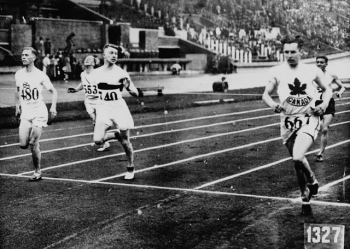Olympic Games

The cavalcade of the Olympic games is the oldest show on earth. Although revived by popular request in modern times, in 1896, the Olympics ran continuously every four years for at least 1200 years in ancient Greece.
Let us go back to the earliest times among the greenwooded slopes and grassy planes through which flowed two rivers in the ancient Hellas, now Greece. The banks of the Alpheus and the Cladeus were overshadowed by willow trees mirrored in the clear sparkling waters.
As the first settlement of Olympia, the ancient site of the Olympics, belongs to mythical times and legend, so do the fables which historians and poets tell of the origin of the greatest and oldest series of athletic competitions on earth.
A story is told by natives of Greece interested in the Olympics – the legend of Pelops. Here the river Alpheus is the background for a story about a king of Elis, with a beautiful daughter named Hippodania. The girl was offered to any suitor who could successfully kidnap her in a chariot. The catch, of course, was that the king gave pursuit, had light chariots, fast horses and was handy with light spears. According to the legend, thirteen young men go away with Hippodamia, but all were caught up with and promptly transfixed with a royal spear.
At any rate, one day a young man named Pelops, showed up, studied the situation carefully. He tampered with the king`s charioteers. The result was the bursting of the wheels of the royal chariots. Thus Pelops won a bride and a throne. He instituted the games and religious ceremonies on the hallowed ground of Olympia in Elis. The date generally ascribed to this episode is 884 B.C. No matter whether or not we accept the legend, one thing is certain – that the first recorded Olympics occurred in 776 B.C., and that thereafter the Greeks began to reckon time by Olympiads the four years intervals at which the games were held.
The games were conducted on the highest plane – almost a religious one. At first only pure Greeks could compete, and for centuries the moral standards were carefully upheld. No one with a police record, or even related to anyone with a police record, could be a contestant.
At first only the sprint or foot-race one length of the stadium was involved. At the games of the 14th Olymplad a second race of two-times around the stadium was added, at the 15th a long-distance race of twelve times around the stadium, and so forth. Interest in all forms of athletics made the Olympics the greatest event in the known world.
Tourists and sport fans as far backs as the fifth century B.C. trooped to Olympia from communities all along the shores of the Mediterranean – France, Spain, Africa, Sicily, Italy, Asia Minor. These regions also sent their athletes and representatives to complete and erect sanctuaries and treasure houses at Olympia. The world looked to peace and cooperation and “good will to man” through the Olympic games.
Although wars did occur, it was evident that the Olympic games had achieved an importance far above that of any other institution or idea of the period. Today is the 21th century and in the atomic age, the Olympics once again present a hope to all nations and races that friendly competition hand in hand with freedom and tolerance can make a better world.
